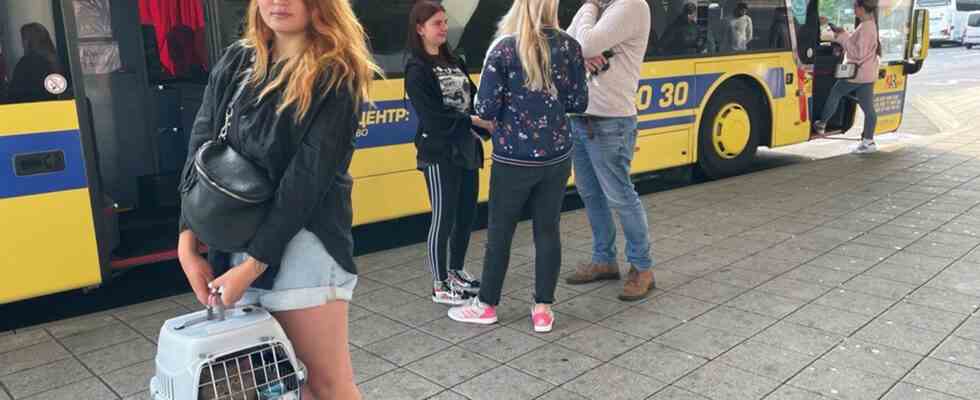Status: 07.06.2022 18:54
Thousands of refugees from Ukraine have returned to their homeland – despite the precarious security situation. The UNHCR warns against a return trip. A researcher reckons with “pendulum migration”.
“Despite the bombing and all other dangers, I want to go home. I miss my country, my city and my husband,” Karyna Chernichenko from Kharkiv tells im Report Mainz-Interview. The 28-year-old has been living in a refugee camp in Cologne for eight weeks, together with her sisters and nephew.
She runs an online shop with her husband. Last Saturday she boarded the fully booked bus to her hometown. Like Karyna, more and more Ukrainian women have set out to go back to Ukraine in the past two weeks. Buses from almost all major cities in Germany go via Berlin and Frankfurt (Oder) to Poland in the Ukraine. From Kyiv the journey continues to Kharkiv or Odessa.
UNHCR warns against return journey
Chris Melzer from the UN refugee agency UNHCR was at the border with Ukraine for weeks after the war began. Opposite to Report Mainz he reports: “I spoke to hundreds, probably thousands, of refugees. They all always said: When do you think we can go back? So the will to go back as quickly as possible was always there.”
In the past few weeks, the UN refugee agency has counted 2.2 million border crossings into Ukraine, mostly from Poland. “With this number, however, there are also many who are only traveling home temporarily. They want to take care of older relatives, get documents or simply check whether the house is still standing,” says Melzer. But at the moment there is no place in Ukraine that can really be said to be safe. UNHCR therefore cannot recommend taking this risk.
“Shuttle migration”: a new phenomenon?
According to research by ARD political magazine many returnees reserve the right to decide to flee again when the danger situation increases. Due to Ukraine’s geographical proximity to Western Europe, migration researcher Franck Düvell from the University of Osnabrück predicts a “shuttle migration”.
“Ukraine is a neighboring EU country. It’s quick and easy to get there. There are no entry or exit restrictions. This gives us a much greater dynamic between the countries. It also allows people to do a kind of trial return. We have to wait and see whether people are now returning permanently, whether they are returning for a limited period. And what I expect is actually a major back and forth. A kind of pendulum migration. And we don’t have that at all in other conflicts, because the trouble spots and the countries of origin are just too far away.”
Topic overview
war in Ukraine
“Families were torn apart”
According to migration researcher Franck Düvell, the desire for family reunification is the main factor behind the risky decision to return to Ukraine now Report Mainz: “In the case of the Ukraine, the men were not allowed to flee, the families were torn apart. Women, children here, men there. They worry about their husbands and, as expected, the desire of the married women to return is quite great.”
But the fear of losing one’s job also plays a major role, reports Oksana Vyhovska, chairwoman of the German-Ukrainian Society in Freiburg: “I know many have already left because the economy needs them. The Ukrainian state must live on. ”
The migration researcher Düvell also confirms this: “Ukraine has lost a fifth of its population due to the flight caused by the war. Historically, the country has also experienced a decline in the population for many years, partly biologically due to aging and low birth rates, but partly also by decades of high emigration rates. First to Russia, then to the EU, to the West. The country is downright emaciated and bled dry.”
A precarious security situation
Oksana Vyhovska has been supporting her compatriots since the beginning of the war, helping them to gain a foothold in Germany, to find accommodation and to deal with the bureaucracy. Now some of the refugees she helped are returning to Ukraine. One of them is Natalia Romanovska, who traveled back to Kyiv with her twelve-year-old daughter two weeks ago. She had a hard time making the decision, says Natalia, she was afraid. But in Kyiv she experienced normality: “Kyiv is almost full. Everyone is coming back, life goes on. The weather is nice, everyone is laughing, everything is fine.”
Just a few hours after the phone call Report Mainz After a week-long hiatus, the Ukrainian capital was again hit with rockets. The next day, Natalia tells her former helper Oksana that she didn’t expect it at all, that she feels desperate and wonders how things should go from now on.
Two days after her departure, Karyna Chernichenko sent a message from home: the journey from Cologne to eastern Ukraine took 38 hours, and she and the other 80 passengers had to wait six hours at the border. But then she and her cat Mocca arrived safely. In their home – a country where war is still raging.

